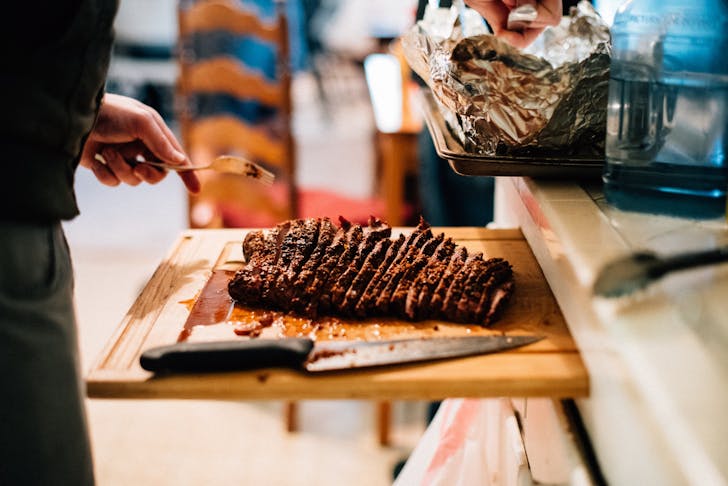There's something quintessentially Aussie about the gas BBQ cook-up. Christmas, birthdays, Saturday arvos with family or mates, in hot or cold weather, meat or vego, for breakfast or dinner—we love a communal fry. And you can dial up that shared appreciation as we hit the summer months.
But whether you're grilling on the outdoor BBQ, frying up on the stovetop inside or taking charge of a cooker in a commercial kitchen, cooking with gas and flame is undoubtedly the best way to go.
First and foremost, gas cooking gives you a faster response speed, with no waiting around for an electric surface to heat up. It also allows you complete control over the flame without any awkward guesswork, and turning that flame off means turning the heat off for a big tick on safety. Finally, gas stovetops are all cookware friendly and certainly more forgiving to those of us lacking in culinary training.
But there's no shame in needing a few tips to nail the perfect cook up. From maintenance to technique tricks–we've put together some handy suggestions to help you get on top of your gas cooking.
Like SWAP'n'GO, we're backing this Aussie summer BBQ season. So, here are 6 tips for cooking with gas.
Keep A Clean Grill
We're kicking off with a fairly obvious but crucially important reminder. Grill maintenance should be at the top of your checklist if you want to consistently nail a successful gas cook up. Beyond obvious reasons for keeping your gas BBQ clean, it's also about safety. Keeping the grill or your stovetop clean means less chance of flare-ups and smoke. You can also shut down your mate who uses "it gives it extra flavour" as an excuse because all that dirty build-up will do is burn the outside of your food and mess up the taste. Also, be sure to check the inside of the BBQ for any grease build-ups. Get yourself a good grill brush and show your BBQ some regular love.
Use Aluminium Foil
Keep in mind that there's more than one way to optimise cooking with BBQ grilling. Certain things can benefit from being cooked away from a high flame or slow and low. For example, use an aluminium foil pouch on the grill to create a mini oven–best done away from burners or on the warming rack with the lid closed (sidenote: that warming rack is multipurpose and definitely underused). This is ideal for grilling fish or veggies like corn and green beans.
Avoid Flare-Ups
As mentioned, the best way to avoid flare-ups and a face full of flame is to keep a clean BBQ and stovetop. But now that you're already doing that, there's a couple of extra ways to prevent singed eyebrows. If cooking with meat, try and use lean cuts or cutting off excess fat, which is more likely to cause a flare-up. You should also empty and clean out the grease tray before a BBQ cook or make sure to always properly wipe down your cooktop. But if faced with a flare-up, there's a good chance it'll subside on its own, so don't panic. If it continues, never try and put it out with water–instead, safely turn off your burners, shut off the gas bottle and close your BBQ lid.
Get Comfortable With Searing
A great benefit of the flame control that comes from gas cooking is being able to so easily sear meat. And while it's a bit of a myth that searing meat seals in the juices, there are plenty of delicious benefits to nailing the technique. Firstly, let's just say it, properly seared meats look even more mouth-watering. You're bound to impress guests if you can master crosshatching using your BBQ grills. Pre-heat your grill and sear each side on a high heat to brown and caramelise the outside, creating a richer depth of flavour. Then lower the heat to keep the inside moist and tender.
Season Your BBQ
While seasoning your meat and veg before cooking is the key to those extra flavours, seasoning your BBQ is also crucial for proper maintenance and longevity. And no, we don't mean salt and peppering your grill. Like with a cast iron fry pan, seasoning your BBQ means oiling and heating your hot plates and grills to make cleaning them easier, protecting them from rust and preventing food from sticking. Avoid olive oil for this and instead use an oil with a high smoke point like canola.
Take Good Care When Cooking Meat
We know it’s easy to carelessly throw a few snags on the barbie and go about your business. But if you’re taking great care of your BBQ, make sure you do the same for the meat you’re grilling. That means taking it out of the fridge a good 15 minutes before cooking and keeping a good eye on it as it does. You should also give meat plenty of space on the grill for an even cook and avoid turning it as much as possible. Finally, to retain all those good juices, be sure not to pierce meat and to let it rest before tucking in–patience is key!
Turn on the flames, grab the tongs and get ready to say: "now we're cooking with gas!" Be sure to fuel your fabulous home-cooking with SWAP'n'GO. It's local, safe and reliable with an array of options, including 'Swap N Go' BBQ gas bottles—it's fast and easy to swap at Elgas. Click here for more info.
Editor’s note: this article was produced in partnership with Elgas. Thank you for supporting the partners who make Urban List possible. To read our editorial policy, click here.
